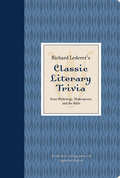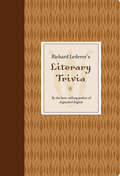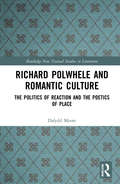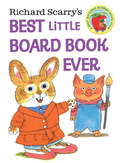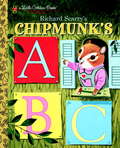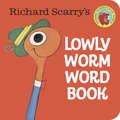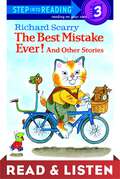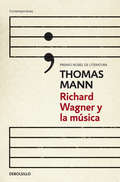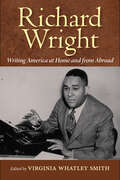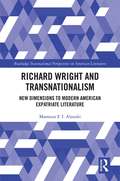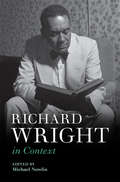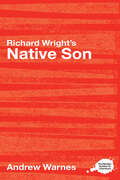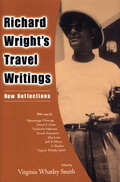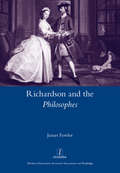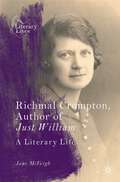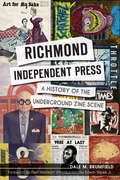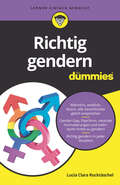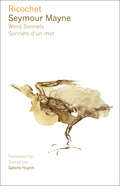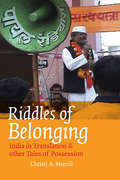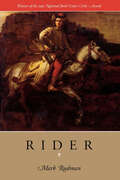- Table View
- List View
Richard Lederer's Classic Literary Trivia: From Mythology, Shakespeare, and the Bible
by Richard LedererIn this follow-up to Richard Lederer&’s Literary Trivia, the author delves into curious facts and anecdotes about mythology, Shakespeare, and the Bible. Through his numerous books and syndicated columns, Richard Lederer&’s infectious love of language and literature has inspired and intrigued readers for decades. Now the author of Lederer on Language and Anguished English delivers a volume full of fascinating trivia about some of Western literature&’s most foundational works. Here you will be able to test—and expand—your knowledge of the Bible, ancient Greek mythology, and the plays and poetry of William Shakespeare.
Richard Lederer's Literary Trivia: From Mythology, Shakespeare, And The Bible [standard Large Print 16 Pt Edition]
by Richard LedererThe author of Anguished English presents a compendium of fascinating facts and anecdotes about some of literature&’s greatest authors and works. Author and English teacher Richard Lederer is one of the world&’s foremost lovers of language and literature. In this endlessly engaging volume, he collects some of the most curious trivia about world-renowned authors and poets as well as their many immortal creations. The perfect gift for bibliophiles, Richard Lederer&’s Literary Trivia sheds surprising new light on the books and writers we love.
Richard Polwhele and Romantic Culture: The Politics of Reaction and the Poetics of Place (Routledge New Textual Studies in Literature)
by Dafydd MooreRichard Polwhele was a writer of rare energies. Today known only for The Unsex’d Females and its attack on radical women writers, Polwhele was a historian, translator, memoirist, and poet. As an indigent Cornish gentleman clergyman and JP, his extensive written output encompassed sermons, open letters, and even headstone verse. This book recovers the lost Polwhele, locating him within an archipelagic understanding of the vitality and complexity inherent in the loyalist tradition with British Romantic culture via a range of previously unexamined texts and manuscript sources. Torn between a desire for sociability and an appetite (and capacity) for a good argument, Polwhele’s outspoken contributions across a range of disciplines testify to the variety and dynamism of what has previously been considered provincial and reactionary. This book locates Polwhele’s work within key preoccupations of the age: the social, economic, and political valences of literary sociability in the age of print; the meaning of loyalism in an age of revolution; the meaning of place and belonging; enthusiasm, religious or otherwise; and the self-fashioning of the provincial man of letters. In doing so it argues for a broader definition of Romanticism than the one that has typed Polwhele as an unpalatable embarrassment and the anachronistic voice of provincial High Tory reaction. This volume will be of interest to those working in the field of late eighteenth and early nineteenth-century British Literature, with a particular focus on politics and on the nature of literary production and identity across the non-metropolitan areas of the British Isles.
Richard Scarry's Best Little Board Book Ever
by Richard Scarry Random HouseConcepts like colors and simple words have never been easier and more fun than when presented by Richard Scarry. Here are two classic board books, THE COLOR BOOK and EARLY WORDS, available for the first time together in one volume.Frannie the bunny shows you all the important words to identify what's in your room, your bathroom, your closet, the kitchen, and the playground. Then Mr. Paint Pig introduces eight colors that brighten the world. Originally published in 1976, these two bestselling board books sold a combined 500,000 copies. Now, bound together for the first time, this is the must-have title that's just the right level for young minds and just the right size for small hands hands. From the Board edition.
Richard Scarry's Chipmunk's ABC (Little Golden Book)
by Richard Scarry Roberta MillerChipmunk lives under the apple tree, in a burrow. He likes to eat cake and pick daffodils.This cheerful book features appealing animal characters, bright artwork in Scarry's early painterly style, and simple sentences that teach the alphabet.
Richard Scarry's Lowly Worm Word Book (A Chunky Book(R))
by Richard ScarryJoin Richard Scarry's Lowly Worm as he introduces more than a hundred words in this board book classic. From tree to sun and car to airplane, this is a perfect choice for children who are beginning to learn preschool concepts!From the Board edition.
Richard Scarry's The Best Mistake Ever! and Other Stories (Step into Reading)
by Richard ScarryIn this Read & Listen storybook, Scarry presents three humorous tales about happily resolved misunderstandings in the busy world of Lowly Worm and Huckle Cat. This ebook includes Read & Listen audio narration.
Richard Wagner y la música
by Thomas MannLa evolución de una pasión durante toda una vida: el arte de Richard Wagner según Thomas Mann. Thomas Mann reservó su entusiasmo y sabiduría de lector meticuloso para aquellos autores cuyas obras le hicieron soñar. Como figura central de este panteón de padrinos culturales se alza Richard Wagner, pasión fundamental del escritor y piedra de toque de algunas de sus novelas. Este libro ofrece una visión plural y cambiante del compositor, a quien Mann admiró sobre todo por haber sabido trascender las limitaciones específicas de su campo y aspirar a la universalidad. «Realmente, no es difícil advertir un hálito del espíritu que anima El anillo de los Nibelungos en mis Buddenbrook, en esa procesión épica de generaciones unidas y entrelazadas gracias a un conjunto de motivos centrales.»Thomas Mann
Richard Wright Writing America at Home and from Abroad: New Reflections
by Virginia Whatley SmithContributions by Robert J. Butler, Ginevra Geraci, Yoshinobu Hakutani, Floyd W. Hayes III, Joseph Keith, Toru Kiuchi, John Lowe, Sachi Nakachi, Virginia Whatley Smith, and John Zheng Critics in this volume reassess the prescient nature of Richard Wright's mind as well as his life and body of writings, especially those directly concerned with America and its racial dynamics. This edited collection offers new readings and understandings of the particular America that became Wright's focus at the beginning of his career and was still prominent in his mind at the end. Virginia Whatley Smith's edited collection examines Wright's fixation with America at home and from abroad: his oppression by, rejection of, conflict with, revolts against, and flight from America. Other people have written on Wright's revolutionary heroes, his difficulties with the FBI, and his works as a postcolonial provocateur; but none have focused singly on his treatment of America. Wherever Wright traveled, he always positioned himself as an African American as he compared his experiences to those at hand. However, as his domestic settlements changed to international residences, Wright's craftsmanship changed as well. To convey his cultural message, Wright created characters, themes, and plots that would expose arbitrary and whimsical American policies, oppressive rules which would invariably ensnare Wright's protagonists and sink them more deeply into the quagmire of racial subjugation as they grasped for a fleeting moment of freedom. Smith's collection brings to the fore new ways of looking at Wright, particularly his post-Native Son international writings. Indeed, no critical interrogations have considered the full significance of Wright's masterful crime fictions. In addition, the author's haiku poetry complements the fictional pieces addressed here, reflecting Wright's attitude toward America as he, near the end of his life, searched for nirvana—his antidote to American racism.
Richard Wright and Transnationalism: New Dimensions to Modern American Expatriate Literature (Routledge Transnational Perspectives on American Literature)
by Mamoun F. AlzoubiRichard Wright and Transnationalism sees Dr. Mamoun Alzoubi argue that renowned American Author, Richard Wright, transformed the way that we approach comparative literature by beginning to look at matters of American racism and Civil Rights in transnational contexts, formed by the new nations surfacing from colonial rule. Richard Wright and Transnationalism demonstrates how Wright, beginning with his work in the 1950s, began to hypothesize the shared history of suffering that linked the experience of slavery, Jim Crow and racism in African American life with the impact of colonialism and neocolonialism on the large communities of Africa, Asia and Europe.
Richard Wright in Context (Literature in Context)
by Michael NowlinRichard Wright was one of the most influential and complex African American writers of the twentieth century. Best known as the trailblazing, bestselling author of Native Son and Black Boy, he established himself as an experimental literary intellectual in France who creatively drew on some of the leading ideas of his time - Marxism, existentialism, psychoanalysis, and postcolonialism - to explore the sources and meaning of racism both in the United States and worldwide. Richard Wright in Context gathers thirty-three new essays by leading scholars relating Wright's writings to biographical, regional, social, literary, and intellectual contexts essential to understanding them. It explores the places that shaped his life and enabled his literary destiny, the social and cultural contexts he both observed and immersed himself in, and the literary and intellectual contexts that made him one the most famous Black writers in the world at mid-century.
Richard Wright's Native Son: A Routledge Study Guide (Routledge Guides to Literature)
by Andrew WarnesRichard Wright’s Native Son (1940) is one of the most violent and revolutionary works in the American canon. Controversial and compelling, its account of crime and racism remain the source of profound disagreement both within African-American culture and throughout the world. This guide to Wright's provocative novel offers: an accessible introduction to the text and contexts of Native Son a critical history, surveying the many interpretations of the text from publication to the present a selection of reprinted critical essays on Native Son, by James Baldwin, Hazel Rowley, Antony Dawahare, Claire Eby and James Smethurst, providing a range of perspectives on the novel and extending the coverage of key critical approaches identified in the survey section a chronology to help place the novel in its historical context suggestions for further reading. Part of the Routledge Guides to Literature series, this volume is essential reading for all those beginning detailed study of Native Son and seeking not only a guide to the novel, but a way through the wealth of contextual and critical material that surrounds Wright's text.
Richard Wright's Travel Writings: New Reflections
by Virginia Whatley SmithAttracted to remote lands by his interest in the postcolonial struggle, Richard Wright (1908-1960) became one of the few African Americans of his time to engage in travel writing. He went to emerging nations not as a sightseer but as a student of their cultures, learning the politics and the processes of social transformation. When Wright fled from the United States in 1946 to live as an expatriate in Paris, he was exposed to intellectual thoughts and challenges that transcended his social and political education in America. Three events broadened his world view—his introduction to French existentialism, the rise of the Pan-Africanist movement to decolonize Africa, and Indonesia's declaration of independence from colonial rule in 1945. During the 1950s as he traveled to emerging nations, his encounters produced four travel narratives—Black Power (1953), The Color Curtain (1956), Pagan Spain (1956), and White Man, Listen! (1957). Upon his death in 1960, he left behind an unfinished book on French West Africa, which exists only in notes, outlines, and a draft. Written by multinational scholars, this collection of essays exploring Wright's travel writings shows how in his hands the genre of travel writing resisted, adapted, or modified the forms and formats practiced by white authors. Enhanced by nine photographs taken by Wright during his travels, the essays focus on each of Wright's four separate narratives as well as upon his unfinished book and reveal how Wright drew on such non-Western influences as the African American slave narrative and Asian literature of protest and resistance. The essays critique Wright's representation of customs and people and employ a broad range of interpretive modes, including the theories of formalism, feminism, and postmodernism, among others. Wright's travel books are proven to be innovative narratives that laid down the roots of such later genres as postcolonial literature, contemporary travel writing, and resistance literature.
Richard Wright: New Readings in the 21st Century
by Alice Mikal Craven William E. DowThis wide-ranging collection of essays contains unexplored themes and theoretical orientations centering on racism and spatial dimensions; the transnational and political Wright; Wright and masculinity, Wright and the American 1950s and 1960s; and some of the first analyses of Wright's recently published A Father ' s Law (2008).
Richardson and the Philosophes
by James FowlerIn mid-eighteenth-century Europe, a taste for sentiment accompanied the 'rise of the novel', and the success of Samuel Richardson (1689-1761) played a vital role in this. James Fowler's new study is the first to compare the response of the most famous philosophes to the Richardson phenomenon. Voltaire, who claims to despise the novel, writes four 'Richardsonian' fictions; Diderot's fascination with the English author is expressed in La Religieuse, Rousseau's in Julie - the century's bestseller. Yet the philosophes' response remains ambivalent. On the one hand they admire Richardson's ability to make the reader weep. On the other, they champion a range of Enlightenment beliefs which he, an enthusiast of Milton, vehemently opposed. In death as in life, the English author exacerbates the philosophes' rivalry. The eulogy which Diderot writes in 1761 implicitly asks: who can write a new Clarissa? But also: whose social, philosophical or political ideas will triumph as a result?
Riches From Our Earth
by C. Truman RogersThe final installment of the Reading Street curriculum series, Reading Street: Grade 6, comes complete with everything you'll need to create English and Language Arts lessons for your child. This system includes reading selections designed to help your child hone his or her skills, a Teacher Resource DVD to make your task of developing lessons easier, and a packet of curriculum materials. Reading Street: Grade 6 is a comprehensive system designed to enhance your child's skills in reading, writing and language. Each assignment in Reading Street helps your child progress toward that goal. While such a dynamic curriculum might sound challenging for you as a parent and educator to use, you can rest assured that the materials will guide you through 12 weeks of English and Language Arts lesson planning with ease. If you prefer a structured homeschooling program format, Reading Street (in all of its Grade level structures) is the right fit for you and your child. Grade 6 comes with two volumes of six units. By the time you complete Grade 6, your child will be able to: Read through a variety of complex literature, including biographies and fictional stories. Discover additional reading material based on personal taste. Relate individual chapters or concepts to the book as a whole. Write complete stories using proper grammar, punctuation and word choice. Compose a written argument using appropriate sources. Examine and edit his or her own writing, as well as the writing of others. Present an oral presentation based on the lessons. Unlike other curricula, Reading Street imparts a love of reading upon your child. From Grade 1 through Grade 6, your child will learn not only the skills he or she needs to advance his or her education, but become a lifelong student and reader. For more information about the specific materials included in the Reading Street: Grade 6 curriculum for homeschooling, visit the Features and Benefits page.
Riches, Poverty, and the Faithful
by Mark D. MathewsIn the book of Revelation, John appeals to the faithful to avoid the temptations of wealth, which he connects with evil and disobedience within secular society. New Testament scholars have traditionally viewed his somewhat radical stance as a reaction to the social injustices and idolatry of the imperial Roman cults of the day. Mark D. Mathews argues that John's rejection of affluence was instead shaped by ideas in the Jewish literature of the Second Temple period which associated the rich with the wicked and viewed the poor as the righteous. Mathews explores how traditions preserved in the Epistle of Enoch and later Enochic texts played a formative role in shaping John's theological perspective. This book will be of interest to those researching poverty and wealth in early Christian communities and the relationship between the traditions preserved in the Dead Sea Scrolls and New Testament.
Richmal Crompton, Author of Just William: A Literary Life (Literary Lives)
by Jane McVeighRichmal Crompton, Author of Just William: A Literary Life celebrates the first two William books, Just William (1922) and More William (1922). As well as a study of her famous character William Brown, this book is an introduction to Richmal Crompton’s less well-known fiction and a story about her writing life. Her multifaceted identity—her deep knowledge of Classical Greek and Latin literature and languages, her life as a disabled writer, and her writing about domestic violence and disability—played a role in her literary persona. Jane McVeigh moves beyond Richmal Crompton’s impact on children’s literature and offers an appraisal of all her writing including her novels and short fiction, her media profile on radio and TV, her impact on her readers—both adults and children—and her international success. Particularly, McVeigh considers Crompton in the context of twentieth century woman writers and the development of crossover fiction for dual audiences. The book argues that as a woman writer pigeon-holed as a writer for children, Crompton’s other novels and short stories have been side-lined and overlooked. More than a century after the first book collection of Crompton’s William stories was published, this biography places Richmal Crompton among other twentieth century women writers.
Richmond Independent Press: A History of the Underground Zine Scene
by Dale M BrumfieldAn acclaimed local author recounts the evolution of Richmond&’s alternative newspapers, comics, and small presses beginning in the Civil Rights Era. As the political and social upheaval of the 1960s took hold across the United States, even the sleepy town of Richmond, Virginia, experienced a countercultural shift. New attitudes about the value of journalism spurred an underground movement in the press. &“The Sunflower,&” Richmond&’s first underground newspaper, appeared in 1967 and set the stage for a host of alternative local media lasting into the 1990s and beyond. Publications such as the &“Richmond Chronicle,&” &“Richmond Mercury,&” and &“Commonwealth Times,&” as well as numerous minority-focused presses such as &“Richmond Afro-American,&” served the progressive-minded citizens of the River City. In Richmond Independent Press, the historian, activist and former &“ThroTTle&” editor Dale Brumfield reveals the untold story of this cultural revolution in the River City.</
Richtig gendern für Dummies (Für Dummies)
by Lucia Clara RocktäschelSie möchten Menschen aller Geschlechter gleichermaßen ansprechen, wissen aber nicht, wie das am besten funktioniert? Lucia Clara Rocktäschel stellt Ihnen in diesem Buch sechs Arten zu gendern vor: von der Paarform über den Gender-Gap bis hin zu unauffälligeren Varianten wie neutralen Formulierungen oder dem Prinzip der Rollenverteilung. Ganz ohne Moralkeule zeigt sie, warum gendergerechte Sprache wichtig ist und wie Sie diese richtig umsetzen - in Studium und Beruf oder auch im Internet. Konkrete Beispiele zeigen Ihnen, wie Sie das Gendern sogar mit Suchmaschinenoptimierung und Barrierefreiheit in Einklang bringen können.
Rick's Carrot: Targeting the r Sound (Speech Bubbles 2)
by Melissa PalmerRick is hungry, but his carrot has disappeared! Who has taken it? Come along on the mission to find it. This picture book targets the /r/ sound and is part of Speech Bubbles 2, a series of picture books that target specific speech sounds within the story. The series can be used for children receiving speech therapy, for children who have a speech sound delay/disorder, or simply as an activity for children’s speech sound development and/or phonological awareness. They are ideal for use by parents, teachers or caregivers. Bright pictures and a fun story create an engaging activity perfect for sound awareness. Picture books are sold individually, or in a pack. There are currently two packs available – Speech Bubbles 1 and Speech Bubbles 2. Please see further titles in the series for stories targeting other speech sounds.
Ricochet: Word Sonnets - Sonnets d'un mot
by Seymour MayneRicochet is a bilingual collection of word sonnets by one of the chief innovators of the form, Seymour Mayne. It includes three sequences of pithy and evocative poems that encapsulate moments of sharp perception while also drawing attention to instants of humour that suddenly appear in daily life. Concise and visual in effect, word sonnets are fourteen line poems, with one word per line. Frequently allusive and imagistic, they can also be irreverent and playful. While informed by other short poetry forms such as the Haiku, Mayne’s word sonnets are deeply influenced by the Talmudic tradition of maxims, proverbs and images that instruct and inform everyday life. Presented with an excellent translation of the poems into French, Ricochet is a unique volume that showcases this innovative new form. The collection also includes a short preface by the poet and an introductory essay by the translator on the challenges of translating word sonnets.
Riddles of Belonging: India in Translation and Other Tales of Possession
by Christi A. MerrillCan the subaltern joke? Christi A. Merrill answers by invoking riddling, oral-based fictions from Hindi, Rajasthani, Sanskrit, and Urdu that dare to laugh at what traditions often keep hidden-whether spouse abuse, ethnic violence, or the uncertain legacies of a divinely wrought sex change. Herself a skilled translator, Merrill uses these examples to investigate the expectation that translated work should allow the non-English-speaking subaltern to speak directly to the English-speaking reader. She plays with the trope of speaking to argue against treating a translated text as property, as a singular material object to be "carried across" (as trans-latus implies.) She refigures translation as a performative "telling in turn," from the Hindi word anuvad, to explain how a text might be multiply possessed. She thereby challenges the distinction between "original" and "derivative," fundamental to nationalist and literary discourse, humoring our melancholic fixation on what is lost. Instead, she offers strategies for playing along with the subversive wit found in translated texts. Sly jokes and spirited double entendres, she suggests, require equally spirited double hearings.The playful lessons offered by these narratives provide insight into the networks of transnational relations connecting us across a sea of differences. Generations of multilingual audiences in India have been navigating this "Ocean of the Stream of Stories" since before the 11th century, arriving at a fluid sense of commonality across languages. Salman Rushdie is not the first to pose crucial questions of belonging by telling a version of this narrative: the work of non-English-language writers like Vijay Dan Detha, whose tales are at the core of this book, asks what responsibilities we have to make the rights and wrongs of these fictions come alive "age after age."
Ride the Edge (Georgia)
by Isabel L. Beck Roger C. Farr Dorothy S. StricklandNIMAC-sourced textbook
Rider: The Rider Quintet, vol. 1 (Wesleyan Poetry Series)
by Mark RudmanRudman skillfully explores his own life and past.Winner of the National Book Critics Circle Award for Poetry (1995) Mark Rudman – poet, essayist, translator, and teacher – has consistently pursued questions of human relationship and identity, and in Rider he takes the poetry of autobiography and confessional to a new plane. In a polyphonic narrative that combines verse with lyrical prose and often humorous dialogue, Rudman examines his own coming-of-age through the lens of his relationships with his grandfather, father, step-father, and son. These memories emerge against the background of a family history anchored in the traditions of Judaism and the culture of the diaspora.
